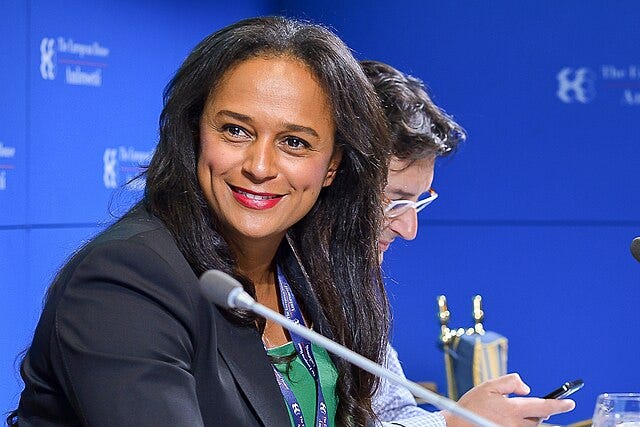🔅 Africa's Wealth Gap & Shell's Nigerian Exit
Plus, Isabel dos Santos' Legal Woes & Comoros' Controversial Election
Photo of the Day

Brief & Bright: Africa's Top Five
Africa's Elite vs. Everyone Else: A Tale of Two Continents
The latest report from Oxfam, "Inequality Inc.", dropped just as the world's business bigwigs are chilling in Davos. Spoiler alert: it's not a feel-good story. Africa's seven richest dudes are sitting on a cosy $52 billion, more money than the poorest half of the continent – that's 700 million people. Let's zoom into Nigeria, where Aliko Dangote, Africa’s richest, basically owns the cement game. His company, Dangote Cement, is enjoying fat profit margins (45%!) while paying peanuts in taxes. Dangote has more cash than half of Nigeria's population. Down south in South Africa, the inequality saga continues: the country's four richest persons have as much wealth as 60% of the population. Over in Kenya, the wealthiest 1% own more than half of the country's financial wealth. The report blames a "war on taxation" for this mess, with corporations paying less tax and privatizing everything from schools to water. African countries rely heavily on corporate taxes, but guess what? An estimated $200 billion is lost annually to corporate tax dodging. Oxfam's suggested game plan for governments? Revitalize the state, rein in corporate power and monopolies, hike taxes on the super-rich, and promote businesses that share the wealth.
Shell's Nigerian Onshore Exit: A $2.4 Billion Deal and a Century of History

Shell's waving goodbye to its onshore oil and gas operations in Nigeria, wrapping up a saga that started way back in the 1930s. The price tag for this historic exit? Only $2.4 billion. The buyer? A consortium of five, mostly homegrown companies, ready to take on the challenge. The British energy titan has been a big name in Nigeria's oil scene since flappers were in fashion, but it's been a bumpy ride with spills, sabotage, and large lawsuits. These onshore headaches have finally nudged Shell to pack its bags, although they'll maintain a presence in offshore operations. The move is part of a larger trend where Western oil bigwigs are opting for greener pastures, leaving Nigeria's challenging onshore fields behind. Environmental advocates, like Nnimmo Bassey, are calling on Shell to clean up its past messes before jetting off. They're talking about full remediation and reparations for the communities affected by pollution.
Isabel dos Santos: A Billionaire in the Eye of the Legal Storm
Angolan billionaire Isabel dos Santos is finding herself facing a dozen fresh criminal charges, including embezzlement and fraud. The daughter of Angola's long-time leader was once at the helm of the state-owned oil firm Sonangol from 2016 to 2017, and is under fire for allegedly using her power-packed position to line her pockets and become Africa's richest woman. Cue Tuesday's radio interview, where dos Santos passionately calls out President João Lourenço's government, urging them to stop managing the country with "fabricated lies." It's not just dos Santos in the hot seat; several of her family members have also been caught in Lourenço's legal net, all denying the charges against them. Flashback to 2020, and it's the same script, different act: dos Santos was charged with embezzlement and money laundering, at which point Interpol issued a "red notice", essentially putting her on the global most-wanted list. Despite the legal whirlwind, dos Santos hasn't been arrested, but she's feeling the pinch with asset freezes worldwide. She tells a tale of financial woe, struggling to pay for her children's education and her own living expenses. Indeed, she no longer graces the Forbes' rankings of the super-rich.
Comoros Election Drama: President Assoumani's Controversial Fourth Term Win
In the beautiful Indian Ocean archipelago of Comoros, President Azali Assoumani has just hit the political jackpot for the fourth time, winning the presidential election with 63% of the votes. But hold the applause, because the opposition is crying foul, calling the whole thing "fraudulent." Mr Assoumani, a former military officer who knows a thing or two about power plays (he first grabbed the reins in a 1999 coup), initially hung up his political boots in 2006 but then made a dramatic comeback in 2016 before removing presidential term limits in 2018. His rule has been riddled with accusations of jailing and exiling those who don't agree with him.
Ghana's Financial Comeback: A Quick Snapshot
Ghana's dollar bonds are on a joyride thanks to a deal to restructure $5.4 billion in loans. This agreement, struck with big names like the Paris Club and China, means serious business. It opens the door for a $600 million disbursement from the IMF under its $3 billion bailout program. Bottom line: Ghana's financial woes could be getting a turnaround, perhaps signalling a brighter economic future.
Food for Thought
“In the moment of crisis, the wise build bridges and foolish build dams."
— Nigerian Proverb








Thank you for sharing the Oxfam report! It bravely explains everything we need to know about why so many people are leading miserable lives while very few sit in their golden ivory towers, built on the toil and suffering of the people. What a pity that we cannot rely on the so-called democracies and elections, if those coming into power just help to increase shareholder values. We need higher ethical and human standards for the benefit of all people!